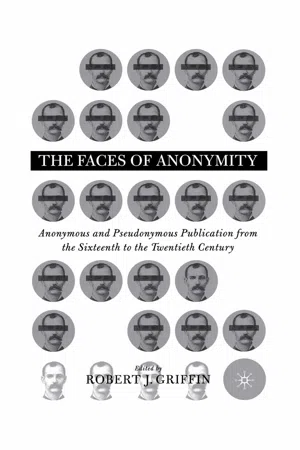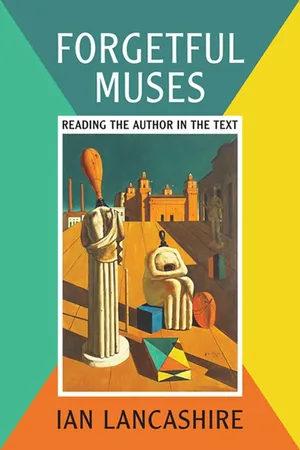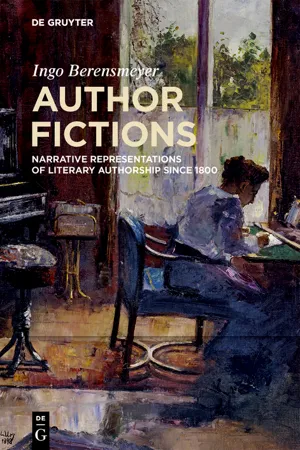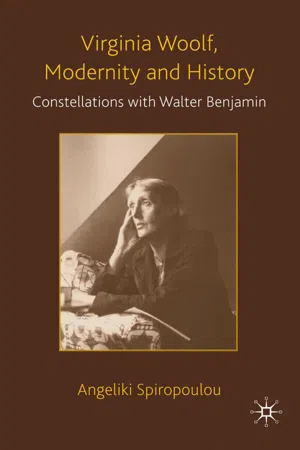Literature
Anonymous Author
An anonymous author is a writer who chooses not to reveal their identity when publishing their work. This can be for various reasons, such as personal privacy, political or social concerns, or to create a sense of mystery around the writing. Many famous literary works have been attributed to anonymous authors, adding to their intrigue and historical significance.
Written by Perlego with AI-assistance
Related key terms
1 of 5
4 Key excerpts on "Anonymous Author"
- eBook - PDF
Faces of Anonymity
Anonymous and Pseudonymous Publication, 1600-2000
- R. Griffin(Author)
- 2016(Publication Date)
- Palgrave Macmillan(Publisher)
Topics covered are genre, gender, nationalism, authorial cross-dressing, collaboration and co- authorship, ghostwriting, hoaxes, attribution, manuscripts, and problems of reading. "Anonymous" is generally understood as a text whose author is not identified on the title page. Pseudonymity is therefore a subset of anonymity; the important fact in both cases is that the legal name of the 2 Robert J Grijfin writer is not in evidence. This widespread practice, which cuts across centuries and affects both the production and the reception of written texts, has been under-researched in relation to its ubiquity. Moreover, the critical work that does exist, much of it excellent, confines itself to an author, a genre, or a period. 2 By gathering essays on different periods together in the same volume, this collection serves (at least) two pur- poses. First, it calls attention to the continuing functions of anonymity in what Coleridge already calls, in Biographia Literaria, "an age of per- sonality." Second, although complete coverage even within these cen- turies is itself impossible, the chronological range reveals significant historical differences, as well as structural continuities. Michel Foucault established a kind of default position for thinking about the relation between anonymity and authorship in his widely cited essay, "What is an Author?" 3 For Foucault, modern literary author- ship is defined by the author-function, by which he means the various ways the name of the author functions in discourse. - eBook - PDF
- Ian Lancashire(Author)
- 2017(Publication Date)
- University of Toronto Press(Publisher)
Authorship attribution research tries to find the name – not the intentionality or the character – of the person who wrote a work. At first, researchers used similarities of thought and meaning between the works of a known author and those of an anonymous writer, but different authors can express the same themes, images, words, or thoughts. A better method situates anonymous texts historically, finds candidate authors who might have written them, and then searches for stylistic evidence with external historical witness about author-ship. We look for an idiolect, that is, for Barthes’s agent of language, and Foucault’s author-function, the one who has a distinctive lexical style. Most authorship-attribution researchers today gather in the dig-ital humanities and practise computational stylistics. They identify a configuration of language markers, each characterized by a distinctive frequency range, with the style of known and Anonymous Authors. We cannot read the frequencies of such stylistic markers as we read a book; they are intelligible only if we believe that words and word combina-tions exist cognitively in the author’s mind, separate from the texts that devolve from them. To the cognitive paradigm of authorship, a text is a secondary phenomenon; it is only the author’s mind that contains feel-ings and intentions. Not all stylistic markers are useful in authorship naming. Stylistics focuses on lexical markers of which scriptors (transcribers, writers) are supposedly unconscious and, therefore, cannot deliberately imitate. Any marker or configuration of markers of which a writer can be con-scious, so it is said, is untrustworthy if we are, by nature, suspicious of potential fraud. Scholars sometimes ignore the requirement of uncon-sciousness, maybe because no one has access to an author’s mind and can tell what is conscious and what unconscious. - eBook - ePub
Author Fictions
Narrative Representations of Literary Authorship since 1800
- Ingo Berensmeyer(Author)
- 2023(Publication Date)
- De Gruyter(Publisher)
The author (as a social role, a professional identity) is part of the institutional infrastructure of literature – neither its origin nor its endpoint but one node in a complex network of activities, identities, and tasks that must come together to make literature – to write a poem, perform a play, or publish a novel. This identity, like others, is socially produced – a disposition that can be inhabited, a habitus in Bourdieu’s sense (1996, 214), or a social role that is acquired. Today, authors still embody a privileged position in relation to ‘their’ texts. Modern copyright laws ensure their ownership and control over their works (Rose 1993, Bosse 2014); the author’s name, next to the title, is the most important “paratext” of a book (Genette 1997, 37 – 54). Authors win prizes. Residual forms of mystification continue to shape the public image of authors as somehow special and to be admired, even though their economic reality is often precarious (Childress 2017, Amlinger 2021). If an author’s name, pseudonym, or tag such as ‘the author of Waverley ’ are already a part of the work, so is the author’s persona or reputation, or any additional knowledge about the person or persons who are ‘behind’ the work but outside the text. Genette asserts that “using a pseudonym is already somewhat like a work. If you can change your name, you can write” (1997, 54). Authors, in writing, create themselves as well as, and by means of, creating a work, even though they may merely consider themselves as “a by- or waste-product of the work” (McCarthy 2016, 2). To do so, however, they depend on other agents within the literary field and the “communications circuit” (Darnton 1982 ; Adams/Barker 2006), and on the attention of an audience. Authors are thus also a “by-product” of such attention, and of the contingencies of recognition. Their success or failure within an “economy of attention” (Franck 2018) may have everything or nothing to do with themselves or their work - eBook - PDF
Virginia Woolf, Modernity and History
Constellations with Walter Benjamin
- Angeliki Spiropoulou(Author)
- 2010(Publication Date)
- Palgrave Macmillan(Publisher)
He argues that ‘since the eighteenth century, the author has played the role of the regulator of the fictive, a role quite characteristic of our era of indus- trial and bourgeois society, of individualism and private property […].’ 33 Significantly, Woolf here also connects individuality, authorship and property as she had previously done in The Years and her major femi- nist essays. The ‘author’, as against Anon, has a name and defines his historical moment and individual existence in terms of what he owns. Woolf reports how Anon is replaced by the individual chronicler whose name is Harrison ‘emerging from the past’ to tell us ‘that he has a library; that he owns a mastiff’. 34 In light of the above, Woolf’s predilection for anonymity can be seen as a critical response to the catastrophes brought about by the individualist and individualizing logic of modernity which culminates in wars. Sig- nificantly, all positive values exalted in Three Guineas, too, are associated with obscurity and anonymity. They rid the mind of envy and spite and install generosity and magnanimity, which in turn constitute the fun- damental premise for an ideal community. She postulates: ‘the power to change and the power to grow can only be preserved in obscurity’, and thus, ‘[w]e must extinguish the coarse glare of advertisement and publicity.’ 35 Woolf defines intellectual liberty in opposition to the use of personal charm or advertisement, which ‘prostitutes culture’. 36 Inversely, in the same piece, anonymous popular art is assigned a revolutionary political and historical role as a remedy against war. 37 It is worth noting in this connection that Benjamin’s praise of Eduard Fuchs’s appreciation of anonymous Chinese art is justified by means of the analogous view that respect for anonymous artists contributes more to the ‘humanizing of mankind’ than the personality cult usually associated with art in modern Western official culture.
Index pages curate the most relevant extracts from our library of academic textbooks. They’ve been created using an in-house natural language model (NLM), each adding context and meaning to key research topics.



